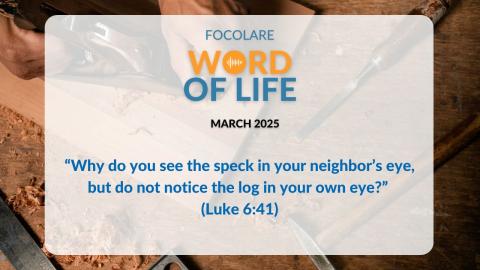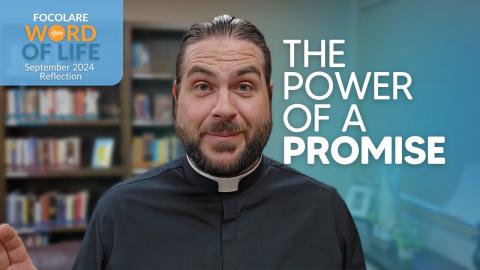“Be of the same mind, having the same love, being in full accord and of one mind.” Philippians 2:2

Photo by Alice Donovan Rouse | Unsplash
When a Republican guy from the South and a Democrat girl from the North meet in law school it’s no surprise that the conversation soon turns to politics. More surprising is that we married and continued the discussion for the next thirty-seven years. The Focolare spirituality has guided our approach to those discussions and taught us valuable lessons for all the politics we encounter.
While many of our debates have been theoretical, focusing on national headlines and elections, others have involved our day-to-day life. When Lori became active in the politics of immigration in the late ‘90s, John was supportive of her trying to help people, growing her contacts and learning the inner workings of advocacy. But we had different perspectives on the best tactics and solutions, which led to some frustrating interchanges. Were we not married and committed to continuing the relationship, we might have stopped talking about it.
That would have been a mistake. With this issue and others, we have both grown through hearing another perspective. As nice as that sounds, it can be painful. Being married means we couldn’t say “You’re nuts!” and walk away. We had to dig into our own beliefs and root out inconsistencies, irrational biases, and the desire to cling to what is comfortable. It not only takes time but also the ability to see “Jesus Forsaken”[i] in the inability to agree. But the result is a more nuanced and rich view of the world and an understanding that seems closer to the truth.
Being married means we couldn’t say “You’re nuts!” and walk away. We had to dig into our own beliefs and root out inconsistencies, irrational biases, and the desire to cling to what is comfortable.
Although we are not involved with national politics or parties at this point, we find ourselves immersed in politics nonetheless. Now retired, John is president of our parish council and chair of the Iowa Network Against Human Trafficking. Lori is on the board of her law firm and next year will be its president. Politics is challenging and consequential to people’s lives in these organizations as well. Here are a few examples:
Relationship before ideology. Early in our marriage, Lori devoted a great deal of effort to immigration law reform in addition to her job as an immigration lawyer. She felt hurt and angry when John’s parents expressed an opposing view on immigration reform. Since they live on the East Coast and we in the Midwest, we didn’t see them often enough to work out these differences. While Lori was committed to keeping up visits for the sake of John and the kids, she emotionally distanced herself from them for several years. Eventually she came to see this period as a lost opportunity to build a better relationship, especially now that their physical and mental health has started to fail. It was a tough lesson, but one we try to keep in mind when dealing with controversy.
Invite and offer other perspectives. We both bring the political problems we are wrestling with to the other because of our differences. The value of candidly discussing an issue far exceeds the risk that we might disagree. On the flip side, we try to avoid the temptation to not state an opposing view simply because we would rather relax and watch TV instead of facing the challenges of dialogue.
Lori uses this same approach on the law firm board by encouraging others to share their opinions even when the group already seems willing to go along with her proposal. So often by hearing from a person with an untapped opinion they come to a different and better decision.
When she is the person not agreeing with the direction of a discussion, she tries to offer her view in the spirit of making the best decision even when it is a bit uncomfortable. Actively encouraging someone to share a different opinion, or offering your own, is taking the initiative in loving.
We also have learned never to assume a group agrees on an important decision without first talking about it. When we fail to actively encourage people to share their perspectives, we sometimes bury problems that eventually explode.
When John became a board member of the Iowa Network Against Human Trafficking, the group was preparing a set of proposed guidelines for facilities serving survivors of human trafficking. Supporters of the guidelines thought that the proposed rules would be a good way to protect survivors and assumed that everyone agreed. Those who felt uneasy assumed that there was a strong majority in favor, so they never voiced their concerns. Preparation of the document went on for months with tremendous time and effort but without any serious discussion in board meetings.
When the completed guidelines finally came up for a vote, however, it was a tie. Then the chair, who had abstained from the vote, broke the tie in favor of approving them. After the meeting, several members who had voted “against” resigned. Regretting his intervention, at the next meeting the chair brought the issue to another vote and the guidelines were rescinded, leading some of their supporters to resign. In total six board members resigned. Soon after, the board chair asked John to begin the transition to succeed him as chair.
Rather than recruiting new board members, John focused first on establishing a culture of dialogue on the board, thinking that no one would join a board without free and open discussions. The board invited a consultant to facilitate board retreats that focused on repairing the broken board process. Later the board unanimously agreed that the guidelines, although well-intentioned, had been developed without input from the facilities and should not have been introduced in the first place. Eventually all but one of the board members who resigned rejoined the board.
When we fail to actively encourage people to share their perspectives, we sometimes bury problems that eventually explode.
The importance of listening. As people with strong opinions, often the hardest thing for us to do is truly listen to the opinion of the other. This means listening for understanding, not just for a break to make our next great point. However, it is important to understand the person speaking as much as the point being made. Sometimes a discussion that seems to be going nowhere on a rational level builds a new relationship based on trust because we listen attentively to the end. When people feel loved and respected, they put persons above ideas and become more objective about opinions. And when trust is built, obstacles that seemed insurmountable at first start to seem manageable.
John experienced this lesson when he was asked to join the parish council of our new parish. Meetings were tense and argumentative, with long off-topic speeches. At one point a member blurted out, “What is parish council supposed to do?” The next week she quit the council and left the parish.
When the term of the chair expired, the next in line turned down the job because of the conflict involved. Then the pastor turned to John, even though he was new to the parish. Instead of introducing his own agenda, he decided to meet separately with the people who did not agree, week after week, trying to understand them and listening to their ideas on what the parish needed. He also led council meetings by listening to and encouraging those who shared their views. After a few months, the tone of the council changed. Remarks adhered to the agenda; members shared candid but respectful comments; clever strategies for improving the parish started to bubble up.
Whenever people gather to make a decision for the good of the group, you have politics, and that’s not a bad thing. After all, Chiara Lubich said that politics is the “love of all loves.” But by adopting the Focolare spirituality as a framework for the politics of everyday life, we have experienced an ever-fruitful dialogue rather than just agreeing to disagree.
[i] In 2000 Chiara Lubich wrote: “We came to know that the greatest suffering of Jesus and, therefore, his greatest act of love, was when on the cross he experienced the abandonment by the Father: ‘My God, my God, why have you abandoned me?’ This touched us to the depths.… We saw him not only in all our personal sufferings, which were never lacking, but in those of our neighbour, often alone, abandoned, forgotten, in the separation between generations, between rich and poor, within the very Church at times, and, later, between churches, then between religions and between persons of different convictions.”










